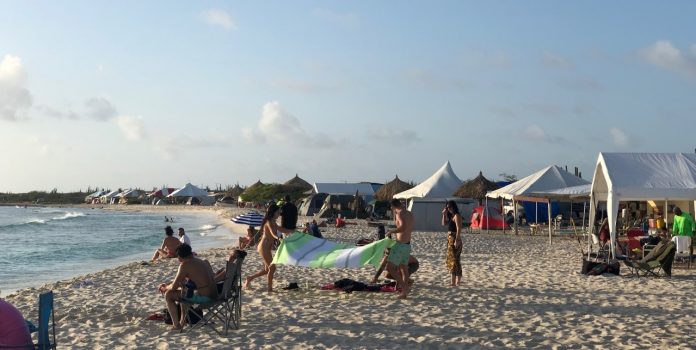ORANJESTAD— You may notice during the first week of April that there are a lot of trailers and tents parked right on the outskirts of beaches around the island. This is a long-standing tradition during Easter weekend, where families and friends gather in large groups and set up camp at the beach.
Camping week in Aruba stretches from April 2nd to April 16th and may be nothing like what you’re used to seeing. Though groups do sleep in tents and spend the entire week at their campsite, most sites have extra facilities. These facilities include trailer-kitchens and portable toilets, making camping much more comfortable—and perhaps even more luxurious.
Though camping in itself is a general custom on the island, each family/group may have their own set of traditions and routines when they go camping, like the Ras family from Paradera.
Before setting up camp, planning starts with procuring (legal) documents. These include camping permits given by the Police Corps (KPA) and contracts for toilet rentals. Do note that camping permits are especially important, because the police are bound to patrol the camping areas during the week. After obtaining a permit, groups assemble to look for and hold a spot at the beach. This is why you may notice some chairs, traffic cones or even ropes stretching across the beaches on Saturday or Sunday before camping week.
Next on the list is planning the menu. The Ras family usually plans hot dogs and burgers for Thursday, and fish for Good Friday. Other than that, soup is a must, chicken and rice (Arroz con pollo) is an Aruban favorite, and for the kids, snacks like pastechi (meat pies), kroket (croquettes), cheese balls, and deviled eggs are necessary to keep them full and energized while they play all day in the blazing sun. When camping with extended family or friends, usually everyone pitches in with food and drinks. As the Ras family matriarch said: “There always someone in the kitchen cooking something up.”
In terms of camp activities, these can also vary from group to group, but one activity you will not miss anywhere is dominos. Usually, every camp site has one or two domino tables ready for use, where the men usually gather and play for hours. Other than that, both children and adults play ‘Mens Erger Je Niet’ (Ludo), Bingo and other board games, or go fishing with lines and nets. On Easter Sunday, the main activity for everyone, and especially the children, is egg hunting.
The Ras family matriarch told our reporter the children traditionally decorate their own eggs before these are hidden around the camping site. They make sure to boil these eggs first, so that no messy accidents happen when painting these. After the kids find their eggs, they are usually cracked open and eaten. But the fun of egg hunting is not exclusive to children; adults may also participate too. For this, the Ras family sometimes hid golden eggs around the area, each holding big prizes, like a bottle of wine, money etc.
Besides this, families may celebrate Easter weekend by walking the “Caminda di Cruz” (Sorrowful Way or Via Dolorosa) to the Alto Vista Chapel located in the northern part of the island or by going to the 3 o’clock church sermon. Some groups that do not go to church but still want to pay respect on Good Friday may hold a moment of silence when the clock strikes 3pm.
And after two weeks of camping, this tradition comes to a close for the rest of the year. Groups deconstruct their sites and leave the beach premises, excited for next Easter, where they can set up camp again and enjoy the feeling of community on the beaches of Aruba.
As said before, camping during Easter vacation is a long-standing tradition for the community of Aruba. This is something that almost everyone on the island grew up with, and it remains a special occasion that feels authentic and our own!

















